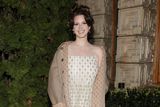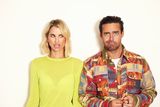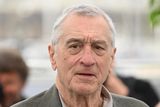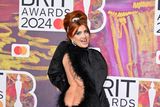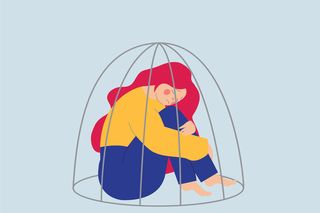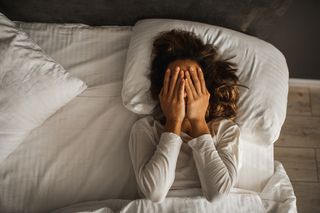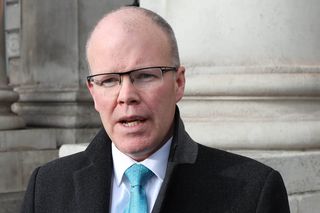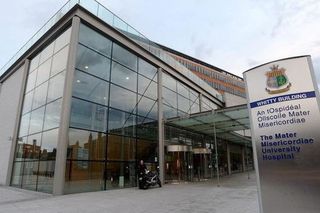Rosanna Davison: ‘It was the most extraordinary experience, arriving in a foreign hospital to see a stranger give birth to your child’
Model, actor and writer Rosanna Davison opens up about her long, emotional journey to motherhood through surrogacy, and how letting go of stress in lockdown boosted her fertility
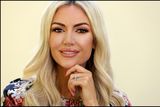
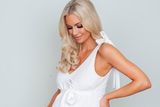
‘It was almost like living a double life, where on the outside, we were healthy, happy, enjoying our lives, getting on with our careers. Then on the inside, I was battling with my own emotions and feelings towards my body, spending hours online reading stories of fertility miracles.”
Rosanna Davison is talking about the jarring juxtaposition between her private and public life that existed, unbeknownst to all but a few family members and friends, for several years after she and husband Wes began trying to have a baby in 2016.
What they had thought of as “a mission that we assumed would be easy” saw Rosanna experience 15 pregnancy losses before the couple finally had their first daughter, Sophia, through surrogacy, then twins Oscar and Hugo, carried by Rosanna herself. It’s a moving story which she has documented in her new book, When Dreams Come True.
The daughter of mega-star Chris de Burgh, Rosanna, now 37, has of course been famous in her own right for years. Scouted for Miss Dún Laoghaire at age 19 when a student at UCD, she went on to win Miss Ireland, and later Miss World 2003. While finishing her degree – she got a first – she began to build a successful career as a model and brand ambassador, and later as a food writer.
She met Wesley Quirke, now her husband, when the pair were 22, at a local nightclub. They married in 2014.
So far, so fairytale.
Having children was something they both wanted, and began to think about seriously roughly a year after they married, Rosanna says now. She’s sitting in their South Dublin home, with one ear on the baby monitor, from which we can hear an occasional gurgle. “Everyone is sleeping,” she smiles happily.
“I cringe a little bit, looking back at the innocence,” she says of the couple’s expectations about how straightforward it would be to have a child.
“I remember in 2015 – we were going on holiday with my family – thinking, ‘Oh, we’ll just squeeze in one more holiday, and then we’ll get going with the family.’ I just assumed it would be easy for us. Miscarriage or fertility issues really weren’t on my radar. From my perspective, somebody in their late 20s, early 30s, could just get pregnant, have a baby, and it would be happily ever after.”
Rosanna became pregnant quickly, and the pair were delighted. But at six weeks, a “creeping feeling of dread” set in, she writes.
Her instinct was right, and she suffered a miscarriage. “It seemed as if I was losing an ocean of blood,” she writes. In an effort to protect Wes from the worst of the experience, and to ensure he got some rest, she sent him to bed. She wanted her mum but didn’t want to wake her, so she called her brother Michael, who lives in LA.
“I’m lying on the floor having a miscarriage. I just need someone to talk to,” she told him.
Her book is full of this kind of thing; details of how close she is to her two younger brothers and parents, and moments where she worries about the emotional load being placed on Wes, her parents and brothers, in the midst of herself being under huge emotional and physical pressure.
Immediately, Rosanna began to hold herself responsible for what had happened.
“At that stage there was no explanation for what had happened, so I assumed it was because I had maybe done too much in the gym, or had that cup of coffee that I shouldn’t have had. I just assumed it was my body, or something I had done.”
For a long time, she blamed the former. “I felt sort of angry at it, or looked at my body as if it was broken; it wasn’t doing what it was designed to do. It took a long time to change my thought process.”
Between 2016 and 2018, Rosanna had 14 early miscarriages. She would have no difficulty getting pregnant, but they never lasted beyond around the six-week mark.
“Hope carried us through,” she says now. “I think maybe from the first loss I always had a vision of us having a family. I never lost that. We had that sense of determination, but it did wobble.”
In 2017, she reached her lowest point. She told Wes that maybe it was time they parted ways.
Rosanna Davison while pregnant with twins Hugo and Oscar. Picture by Lili Forberg
“I found that we were so focused on the next step, the next set of tests, the next doctor we would see at a fertility clinic, you’re living in this very strange reality where you’re seeing other people get on with their lives, and have families, but you’re just sort of stuck in this same cycle.”
She felt they were getting nowhere. “I thought time was moving on, maybe it’s best that he finds somebody else to have children with. Because it’s what he really wants, and it doesn’t look likely that I’m going to be able to produce any children any time soon.”
Wes was having none of it, and told her that whatever happened, they were building a life together.
“But it became apparent, through navigating our way through the emotions, and the grief, and the loneliness, that we had to really look after each other. I can see how couples can be torn apart or struggle through an infertility battle, because it really does put a lot of pressure on you.”
Throughout, Rosanna and Wes confided in close family and friends, but she describes the isolation of their situation, and her response – to escape into a heavy workload and study schedule.
“It’s a very lonely, traumatic place to be, when you’re watching your friends have babies, and then of course your friends are busy, and distracted. There was this feeling of not wanting to burden others with your problems.”
She writes about the language we use around pregnancy loss, and the secrecy that surrounds it, both of which can make it more difficult for those experiencing miscarriage.
“That first loss, it really shook me. To go from one minute having that primal feeling of growing a human being, to it just all falling apart. What I was shocked about as well was the lack of discourse around fertility and miscarriage.”
Read more
She recalls how people trample in with insensitive questions such as: when are you going to have a baby?
“I didn’t know what to say, and I was just so heartbroken at what we were going through at the time.”
As things went on, she became more confident at saying to people, “I actually can’t have a baby myself without help.”
“I certainly felt that sense of stigma and shame and embarrassment about my body, at the start anyway,” Rosanna adds. “It took a lot of work and making peace with the idea that I couldn’t have a baby myself to get past that.”
By early 2018 they had run out of other options, and it became clear they would need to consider surrogacy. After a huge range of tests, Rosanna’s doctors had felt that her inability to maintain a pregnancy past six-and-a-half weeks was related to her immune system activity. IVF was not an option, as Rosanna had no difficulty getting pregnant.
“I couldn’t continue taking immune-suppressing medication. I was exhausted from going through the cycle of pregnancy hormones as well. There was a stage where I was nearly getting pregnant every cycle. For your body to go up and down like that is exhausting.”
At first, the idea of surrogacy horrified her. “I thought, ‘How can I relax, knowing there’s a stranger carrying our child in a different country?’ It just felt so unnatural.”
But they got used to the idea, sought legal and medical advice, and began the process. It took almost a year to get everything sorted and accepted, in October 2018, on a programme in Ukraine.
A surrogate was found in early 2019, and Rosanna went to Kiev for the egg retrieval process, where 23 eggs were extracted. In March 2019, they were told their surrogate was pregnant.
“For the first time in the whole process, we hoped,” she writes.
She recalls the anxiety throughout the pregnancy, the rollercoaster of emotions between each scan. “It just felt so out of my control. I didn’t know what our surrogate was doing, or where she was,” she explains, adding that control, or rather lack of it, and the difficulty of that, was a major part of the entire experience – both with their fertility issues, and then later surrogacy.
There was also the darker side of the situation to be worked through. “The feeling of, ‘How is this possible that this baby can grow in her body, but not my body?’”
At 19 weeks, Rosanna asked if it would be possible to see a bump picture.
“This probably sounds a little bit sad now,” she says with a smile, “but every week I had Googled pictures of a bump, just to see the size and try to imagine something.”
Their surrogate themed the picture in pink clothes and interiors, because the baby was a girl.
“It was such a sweet gesture, but it was almost too much for me, to see the human behind the pregnancy. Up until that stage, we’d been on this very medical, legal path.”
Rosanna writes poignantly about the toll of all of this on her mental health. It had become normal, she notes, to feel anxious and stressed all the time.
“I had built myself up to expect something would go wrong. So nearly every time my phone rang, or I got an email, I jumped, because I thought, ‘This is them, ringing to tell me something has gone wrong.’ It’s an awful way to live, really, and I suppose my default was to just make myself as busy as possible.”
Sophia was born in late November 2019. “It was the most extraordinary experience, arriving in a foreign hospital, in a country you’re not familiar with, where a stranger is about to give birth to your child,” she recalls now.
Rosanna and Wes were present at the birth – and, as had been pre-agreed, she cut the umbilical cord.
“I remember just stopping at the door, because the surrogate was facing us on the birthing chair, and I could see Sophia’s head, right there, coming out. I thought, ‘It’s happening. There’s someone giving birth right in front of me, who I’ve never met before, and it’s my child.’”
Rosanna Davison and Wesley Quirke and their identical twins Hugo and Oscar
She doesn’t freeze in many situations, she says, but she did then. Her mother, Diane, had to push her gently into the room.
“Is she OK? Is she OK? Is she OK?” she recalls asking the doctors. And repeatedly, “Thank you, thank you, thank you,” to their surrogate.
“And then Sophia was ours. I remember that night, staying up just watching if she was breathing or not.”
They got home in time for Christmas, and Rosanna began to relax into motherhood, albeit with the usual exhaustion that comes with a newborn. When she began to feel particularly tired, or when certain food smells made her nauseous, she just put it down to weariness.
In fact, Rosanna was pregnant. In early 2020, she suffered her 15th miscarriage. The blow was made somewhat easier to bear because she had a baby to go home to.
And there was the fact that, on this occasion, the pregnancy had lasted for 10.5 weeks, the furthest she had ever got.
Lockdown began, and Rosanna, who had always pushed herself rather relentlessly in her professional life, began to relax like never before.
“I could feel myself unwinding with each day that passed, enjoying the family time together,” she writes.
By April she was pregnant again. A scan on May 7 revealed that Rosanna was pregnant with twins, and in late November, Hugo and Oscar were born.
Looking back, she finds the fact that lockdown so dramatically changed her schedule, where before she “never gave [herself] a break”, very significant.
“Maybe it’s a combination of both my parents’ personalities in me,” she laughs. “I feel that I have to be doing something all the time that’s productive. Looking back, I think my inability to slow down and relax probably did drive an awful lot of the issues. But then again, you can’t say to a woman, ‘Just relax, it’ll happen.’ Because you just can’t.
"Your mind is constantly aware of where you are in your cycle, what you should be feeling at a certain time, when to think about getting pregnant. It’s useless to say ‘relax’.”
She feels that the unique set of circumstances of last year allowed the pregnancy to progress. Their surrogate had contacted them in January of 2019 to say she would be happy to carry another baby for them, so that had taken the pressure off; it had begun to look like they would have the family of their dreams. Having a newborn took all of her focus, which had previously been so caught up with their infertility issues.
To her surprise, survivor’s guilt hit after she became pregnant, she admits. “It’s something I still feel, to be honest, and something I still have to work through.
“When it became apparent that I was carrying two healthy boys, obviously I was overjoyed, but I really had to work through feelings of thinking, ‘God, I shouldn’t be this lucky.’ I’d made peace with me being the girl who couldn’t have a baby naturally, without help. I had very much become comfortable with saying to strangers, ‘I can’t have a baby myself.’
“So you have this view of yourself that is established, and you’re comfortable with. I had to work back through it. I can have two babies. I didn’t think my body was even capable of having one. It was such a strange feeling, it was like I didn’t know myself anymore. I didn’t recognise who I was.
“After I had spoken publicly about expecting Sophia through surrogacy, I had heard numerous stories from women and men about their own struggles with infertility and pregnancy loss,” Rosanna adds, “and I had been comfortable with sharing my story in the hope that it would help others in a similarly difficult situation.
"I still have deep empathy and compassion for anyone going through a struggle with fertility, and I still feel a sense of guilt that I have my healthy babies when others haven’t been so fortunate.”
For now, all childcare is being looked after by Rosanna, Wes and her mother. It’s full on, she says, even a trip to the local shops is a major operation. But the happiness shines from her.
“It’s everything I thought it would be and more. I suppose the main emotion is that I feel like I’m bursting with love every day. Watching children grow up and develop is just magical.”
‘When Dreams Come True’ by Rosanna Davison, published by Gill Books, €16.99, is out now
Read more
Join the Irish Independent WhatsApp channel
Stay up to date with all the latest news



